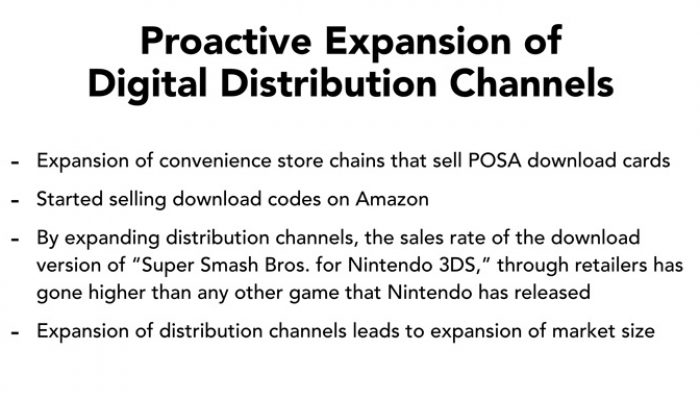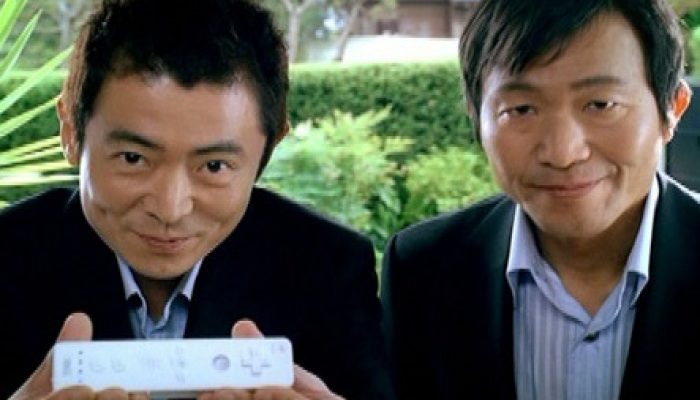 “Various alliances are possible, not only for software development but also for hardware and for the active use of our IP.”
“Various alliances are possible, not only for software development but also for hardware and for the active use of our IP.”
☆ NintendObs Event – Nintendo FY3/2015 Q&A.
Question:
I would like to ask you about Nintendo’s business alliance strategy. You have announced the alliances with DeNA and Universal Parks & Resorts one after the other. What are your criteria and conditions for choosing a partner? Is it likely that you will establish stronger alliances with future candidates by way of using your own treasury shares for capital participation? As for the potential alliance partners, I understand that, in the past, you have often collaborated with your licensees and utilized external resources in the software development field, and most recently, it appears to me that you have been willing to collaborate with others in new business fields. Are there any business fields for which you will need further alliances? Is it likely that you will form an alliance in the hardware field? Or, has the company already decided on a fairly precise outline of the overall future alliance strategy, including the new business fields into which Mr. Iwata intends to advance?
Answer:
Iwata:
The fact that we have not only executed a business alliance with DeNA but also a capital alliance with them seems to have had a certain level of impact. I mean, although Nintendo had been citing the possibility of such an alliance for years, we had not actually executed many and since we announced an alliance with a company that many of you didn’t expect, the announcement seems to have been received with surprise and had an impact on you. Nintendo is a company that, when considering possible alliances, believes that it must carefully review such factors as whether or not each company’s strengths and weaknesses will smoothly complement each other and if the corporate cultures of both companies will work in harmony, rather than focusing on the potential short-term advantages. Talking about alliances in general, most of them in today’s business world, as I see them, have not worked out very well. More specifically, it is often the case that the corporate cultures of the two companies just do not integrate well or that even though the top executives have agreed to work together, the people at the forefront of the actual projects are not able to establish common grounds for working together. We believe that if we are going to make an alliance, we have to produce results. If we cannot produce results, it will not only make the alliance meaningless but also may hurt the company’s corporate value in the mid-to-long term. In that sense, Nintendo is a fairly cautious and careful company. As a result, we spend a significant amount of time to comprehend the strengths and weaknesses of both companies and to confirm each company’s corporate cultures. We not only carry out discussions with key people at the management level but also involve those who may actually work together in order to review if the alliance will be truly beneficial for both companies. We do so in order to avoid situations where we seemingly have the same interests but are in conflict behind the scenes. Because of such a thorough review process, some may say that we are slow in making alliances, but if we are going to make an alliance, we want to lay the foundations for the best possible results.
If I can talk a bit more about our just-announced alliance with Universal Parks & Resorts, we first met with them in April last year when I was visiting the U.S. on a business trip. We met with people from NBCUniversal who proposed the possibility of the theme park business to us. Even before then, the possibility of theme park attractions (with Nintendo IP) had become an often-discussed topic in society. Even inside Nintendo, the possibility had been discussed several times. But we had not made this a reality because, on each occasion, the time was not ripe yet or we were not able to find an appropriate partner with whom to work. In the case of our first meeting with Universal Parks & Resorts, they provided us with a very detailed proposal right from the beginning. Also, as we met right after they had opened the Harry Potter attractions, we were able to learn precisely how they had been created. We received a great deal of useful information from the first meeting for us to review if they possessed a corporate culture which would ensure us the ability to license our IP to them and to work well together. Since the proposal was so specific, as soon as I returned to Japan, I informed Mr. Miyamoto, of our company, and told him that I wanted to give positive consideration to it. Since then, we have met with them several times in Japan and in the U.S., and not only me and people who carry out our negotiations but also members from each company’s creative side, namely, people who will be assigned to make the actual attractions and Nintendo’s game producers who have been creating our games for many years. As a result, we confirmed that we share a lot of common ground between our corporate cultures, and because parts of the proposal made us really excited, we have decided to work together on a long-term basis.
Back to your questions, various alliances are possible, not only for software development but also for hardware and for the active use of our IP. In fact, we have received quite a few proposals for business collaborations as well as the proposals that take advantage of Nintendo IP. On the other hand, the probability that these proposals will eventually materialize as a business alliance or IP license is not very high. When it comes to capital alliances, since they require the decision to make a deeper relationship between two companies for the mid-to-long term, we foresee even less probability. Having said that, however, our basic idea is that if our partnering with another company will enable us to do something that we cannot do by ourselves, we should do it. When we enter into a business alliance, if we are able to establish a firm capital relationship by wisely using our treasury shares, it is an important option for us to consider, and we will not rule out that possibility for the future, either. If we conclude that we should do so, we would like to boldly make that kind of decision. Accordingly, I hope you understand that (when we consider our business alliances) Nintendo makes decisions only after spending a considerable amount of time thoroughly reviewing whether or not we will be able to establish a favorable mid-to-long term relationship, if the corporate cultures of both companies blend well and whether or not the strengths and weaknesses of each company will complement each other.
— Financial Results Briefing for the 75th Fiscal Term Ended March 2015
Source: Nintendo JP.
At NintendObserver, the comments are on Discord.
Click on Community to learn more. 🙂
…
…Wanna play? Buy a Wii U.
And if you’ve already got yours, here are all the games already available on the platform. 😀



